Dilatation cardiomyopathy is a serious pathology, due to which the chambers of the heart expand, and the process of pumping blood is disrupted. The disease is accompanied by pronounced clinical signs, with which it is important to consult a cardiologist in a timely manner.
Comprehensive diagnostics will help to establish an accurate diagnosis and select the most effective treatment. A complication of the pathology is arrhythmia, thromboembolism and even death of a person.
Record content:
- 1 Epidemiology and incidence of dilated cardiomyopathy
- 2 Disease types
- 3 Causes and risk factors
- 4 The mechanism of development of the disease
- 5 The main signs
- 6 Features of dilated cardiomyopathy in children
- 7 How is the diagnosis made? Research and their criteria
-
8 Treatment methods for adults, children
- 8.1 Conservative therapy: patient support and symptom management
- 8.2 Operation
- 8.3 Folk recipes
- 9 Possible complications and consequences
- 10 Causes of sudden death in dilated cardiomyopathy
- 11 Forecast
- 12 Video about cardiomyopathy
Epidemiology and incidence of dilated cardiomyopathy
Dilated cardiomyopathy is characterized by damage to the heart tissue. The disease is accompanied by the expansion of one or two ventricles of the heart. More often, the disease occurs due to a hereditary factor.
According to medical statistics, 60% of patients with heart pathologies suffer from dilated cardiomyopathy. The disease is detected between the ages of 20 and 50. Rarely, pathology occurs in children or the elderly. Men are more likely to get sick compared to the fairer sex (60-80%).
Disease types
Given the origin of dilated cardiomyopathy, doctors distinguish the following forms of the disease:
| Name | Description |
| Idiopathic | The cause of the disease is unknown |
| Family genetic | Pathological processes occur due to heredity. |
| Immunoviral | The disease develops against the background of autoimmune pathologies or as a result of a viral infection. |
| Alcoholic toxic | Cardiomyopathy occurs with alcohol abuse or after chemical poisoning. |
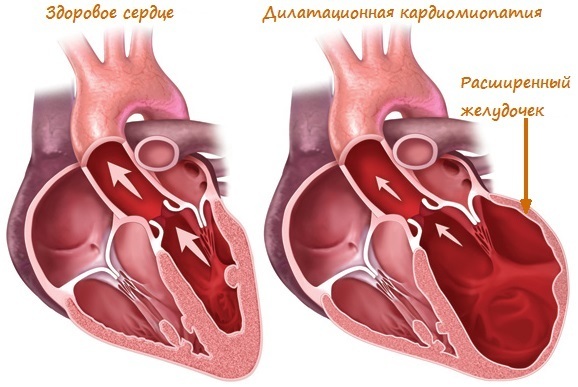
A cardiologist will help to establish an accurate diagnosis. It is necessary to consult a specialist when the first clinical signs appear, undergo a comprehensive examination and start treatment. Without therapy, pathological processes will progress and lead to serious complications.
Causes and risk factors
There are numerous provoking factors against which dilated cardiomyopathy develops:
| Name | Description |
| Heredity | In 30% of cases, the patient has relatives with a similar disease. The development of pathology provokes Barth's syndrome (a rare genetic disease that affects metabolic and neuromuscular processes in the human body). |
| Toxic causes | In 30% of cases, this concerns the abuse of alcoholic beverages. Dilated cardiomyopathy is also provoked by toxic substances that are part of heavy metals, aerosols. |
| Autoimmune Disorders | The pathology is provoked by cardinal autoantibodies, however, the doctors have not found out the main reason for their appearance. |
| Metabolic factors | As a result of improper nutrition, the human body suffers from a lack of vitamins and minerals (carnitine, selenium, protein, vitamin B). |
| Viral disease | Associated pathologies are cytomegalovirus, herpes, adenovirus. |
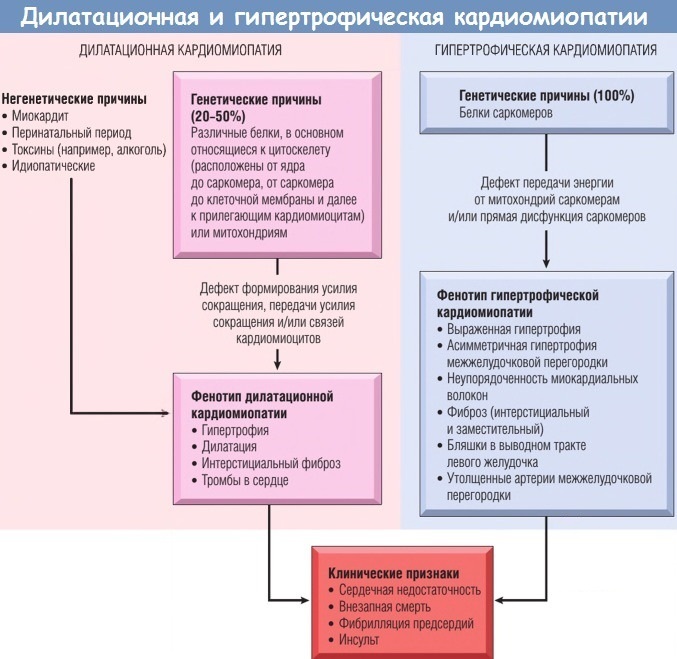
Among the risk factors are bad habits, unhealthy diet. Diseases that affect the condition of the myocardium can also lead to the development of dilated cardiomyopathy.
The mechanism of development of the disease
Pathology is characterized by the expansion of the ventricles, in which a large amount of blood accumulates. Its gradual increase leads to stretching of the walls of the organ, while the muscle mass remains the same. The layer of functional cells becomes thin.
Pathological changes lead to the development of chronic heart failure. A progressive disease affects the output of the heart, reducing it, from which all internal organs of the human body suffer.
Dilated cardiomyopathy provokes numerous pathological changes in the heart:
- organ conductivity is impaired;
- blood clots are formed, which can come off and clog the vessel;
- chronic heart failure disrupts the work of all internal organs as a result of deterioration in blood circulation;
- heart rate also changes;
- the chambers of the heart expand;
- cardiac contractions increase.
Dilated cardiomyopathy will gradually lead to patient death if treatment is not started promptly.
The main signs
Clinical symptoms of pathological changes in the heart area will help the cardiologist determine the degree of organ damage and select the most effective examination.
Dilated cardiomyopathy is accompanied by the following symptoms: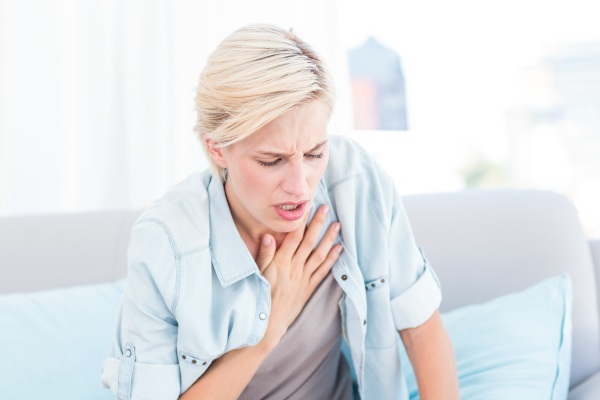
| Name | Description |
| Pain in the chest area | The attack may be accompanied by a slight tingling sensation or unbearable pain. Sensations of a constricting or aching character of varying duration. They occur both after physical exertion and at rest. |
| Shortness of breath | In the early stages of the development of the disease, the symptom occurs after physical exertion. As the pathology progresses, shortness of breath always accompanies a person. It is difficult for him to climb stairs and even get out of bed. The clinical sign indicates a violation of gas exchange in the heart. |
| Arrhythmia | An accelerated or slowed heart rate can be life-threatening. In some situations, arrhythmia provokes a sharp drop in blood pressure. The patient is sick, dizzy, he loses consciousness. |
| Weakness in the body | The disease is accompanied by a decline in strength, a person's working capacity also decreases, and apathy towards the world around them arises. At a late stage in the development of dilated cardiomyopathy, it is difficult for the patient to perform work duties, against the background of which social life is disrupted. |
| Cyanosis | The pathological condition is characterized by a blue discoloration of the skin in the area of the nasolabial triangle. |
| Headache | A pronounced symptom that occurs in the occiput or crown. A headache of a long-term character that occurs regularly passes periodically. |
| Vertigo | The orientation in space is violated. |
| Mental disorders | A person becomes nervous and irritable, he is disturbed by hallucinations, delusions, depression. |
| Heaviness in the right hypochondrium | Against the background of stagnant phenomena, the liver enlarges. For this reason, there is discomfort and pain on the right side under the ribs. |
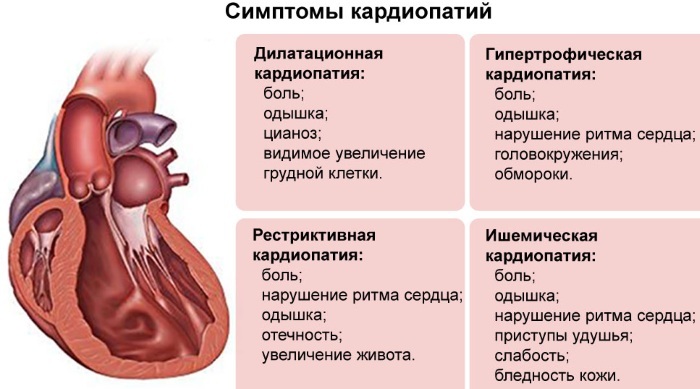
Dilated cardiomyopathy is also associated with increased sweating, especially at night. The skin turns pale. In the evening, the lower extremities are swollen, it is inconvenient to wear shoes.
Features of dilated cardiomyopathy in children
Dilated cardiomyopathy also occurs in children. The main reason is heredity. Pathological processes appear under the influence of negative factors. The disease leads to the gradual development of heart failure, thrombosis.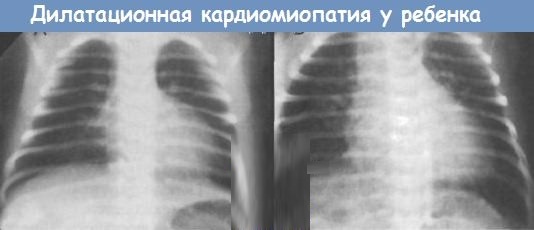
The congenital form of the pathology often leads to the death of the patient. Children die before the age of 2 months. Acquired dilated cardiomyopathy does not allow a small patient to live to adulthood. Symptomatic therapy is carried out, and medications are also prescribed to eliminate concomitant pathologies.
How is the diagnosis made? Research and their criteria
The diagnosis and treatment of dilated cardiomyopathy is carried out by a cardiologist. In some situations, you may need to consult a surgeon.
To make an accurate diagnosis, the specialist prescribes the following examination methods for the patient:
| Name | Description |
| Electrocardiography (ECG) | The specialist evaluates the functionality of the heart. Reveals deviations in his rhythm. |
| Echocardiography (EchoCG) | An informative diagnostic method that allows you to determine even minor changes in the work of the heart. Helps to identify pathological processes in the early and late stages of development, and to predict the course of the disease. |
| Coronography | The study allows you to determine the parameters of cardiac output, the tension of the walls of the organ, to assess the condition of the pulmonary arteries.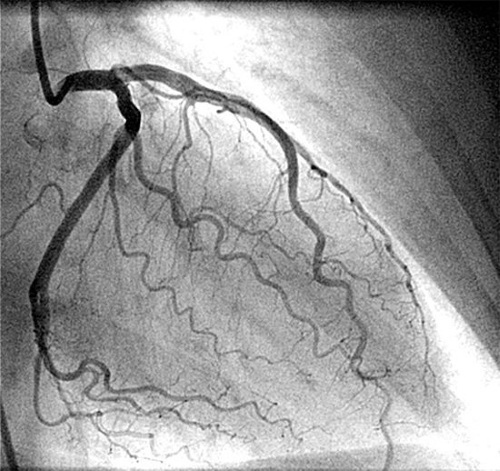
|
| Blood analysis | The results will show the general condition of the human body, help to identify the development of the inflammatory process, the presence of hormonal disorders or toxic substances. |
| Computed tomography (CT) | The most informative examination methods that allow the specialist to study in detail the anatomical structures of the heart. Reveal abnormalities in myocardial tissues and determine the degree of development of pathological processes. |
| Magnetic resonance imaging (MRI) | |
| Ultrasound examination of the heart (ultrasound) | The examination allows you to determine the size of the ventricles of the heart, view their structure and assess their functioning. |
Additionally, genetic tests are carried out to help establish a hereditary predisposition to the disease.
Treatment methods for adults, children
The cardiologist selects the treatment after a full comprehensive diagnosis. The specialist takes into account the patient's condition, the test results obtained and the individual characteristics of the human body. It is important to strictly adhere to the prescriptions, since without therapy, progressive pathological processes entail serious complications.
Patients are prescribed special drugs, if there are no serious contraindications, you can use folk remedies. In emergency or serious situations, surgery is performed.
Conservative therapy: patient support and symptom management
Medicines should be taken strictly according to the scheme that the doctor selected for the patient after the examination. The drugs contain active ingredients that provoke side effects. You cannot take medications on your own in order to avoid serious health complications.
Dilated cardiomyopathy involves taking the following medications: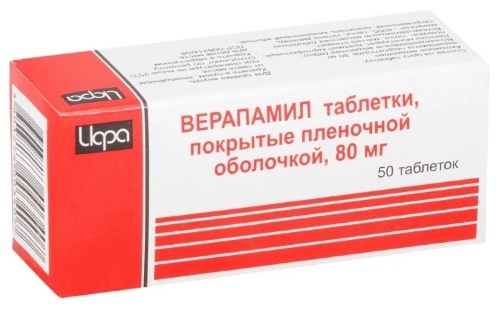
| Drug group | Name | Application |
| Antiarrhythmic drugs | Amiodarone, Hindin | Medicines help restore myocardial contractility. The drug is taken orally with water before meals. The recommended dosage for adult patients is 600-800 mg per day. The course of therapy lasts 10-14 days. |
| Antihypertensive drugs | Verapamil, Physiotens | For adults, the drug is prescribed at 40-80 mg 3 times a day. Children's dosage depends on the age of the patient and is 40-360 mg per day. The prescribed volume of the drug must be divided into 3-4 doses. The drug is taken with food or after a meal with plenty of water. |
| Anti-thrombotic | Aspirin Cardio | The medicine restores the rheological properties of the blood. The recommended dosage is 100-200 mg per day or 300 mg every other day. The drug is taken orally before meals with a small amount of water. |
| Diuretic drugs | Furosemide, Hypothiazide | The adult dosage depends on the condition of the person and is 40-120 mg per day. For children, the medicine is prescribed at 1-2 mg / kg per day. |
| Angiotensin-converting enzyme inhibitors | Zofenopril, Ramipril | The drugs compensate for heart failure. The average dosage for a patient is 30 mg once a day. |
| β-blockers | Bisoprolol, Betaxolol | The medicine is taken in the morning on an empty stomach, inside and without chewing. The adult dosage is 5 mg once. Taking into account the patient's condition, the doctor can increase it to 10-20 mg. |
| Peripheral vasodilators | Nitroglycerin, Naniprus | The medicine is taken under the tongue. The adult recommended dosage is 0.15-0.5 mg per dose. In an emergency, the drug can be taken again 5 minutes after the first time. |
| Anticoagulants | Warfarin, Heparin | The drugs should be taken orally once a day and preferably at the same time. The initial dosage is 5 mg per day for the first 4 days. Then a maintenance dosage of 2.5-7.5 mg is prescribed. |
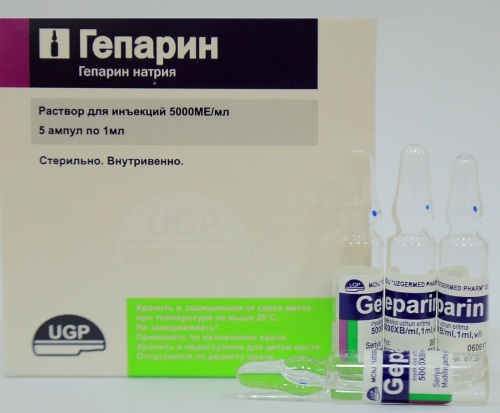
Additionally, patients are prescribed vitamin complexes with minerals based on potassium and magnesium (Asparkan). Medicines reduce swelling, shortness of breath, restore the functioning of the ventricles of the heart. Improves not only the patient's quality of life, but also exercise tolerance.
Operation
Dilated cardiomyopathy in emergency situations or for medical reasons involves surgical intervention. The operation allows you to restore the anatomical integrity of the heart structures, for example, in case of rheumatism, defect or inflammation.
Surgical treatment involves prosthetics, the installation of a pacemaker, carried out by the following methods:
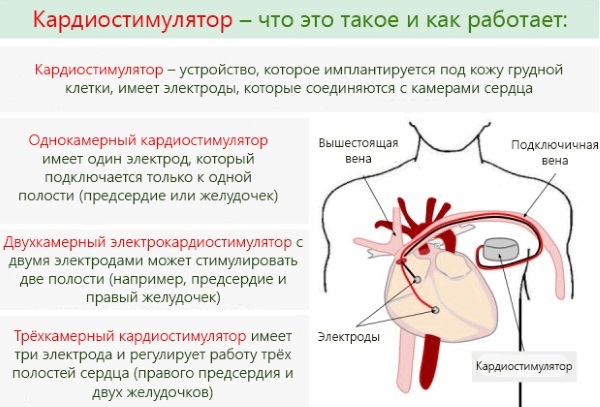
| Name | Description |
| Cardiac resynchronization therapy | In the area of the right atrium and ventricles, special electrodes are installed. They are necessary for better contraction of the heart due to supplying nerve impulses. |
| Enveloping the heart | During medical procedures, a special CorCap bag is used. This is an elastic frame that covers the ventricles of the heart. The organ stops growing and the progression of dilated cardiomyopathy stops. |
| Mechanical ventricle implantation | During the operation, a small pump is installed to improve blood circulation. |
Heart transplant is a radical method of treatment, it is prescribed in extreme cases, when other therapy options do not help save the patient's life. The operation is dangerous for a person, it is extremely difficult to find a donor.
Folk recipes
The use of prescriptions of healers and healers is permissible, but strictly after consultation with the attending physician. Many of the components used can provoke an allergic reaction or individual sensitivity. It is important to select effective and safe means with a cardiologist.
Alternative methods for dilated cardiomyopathy:
| Name | Recipe | Application |
| Linen | Pour 1 tbsp. flaxseeds with boiling water (1 liter). Put in a water bath and heat for another 50 minutes. Cool, strain and take the broth inside. | The seeds of the plant contain organic acids, due to which they have a positive effect on the tissues of the heart. The finished broth should be consumed in 0.5 tbsp. everyday. The specified volume must be distributed over several doses during the day. |
| Motherwort | Boil 30 g of herb with boiling water (500 ml). Insist 1 hour and strain well. | The resulting medicine must be taken in 1/3 tbsp. 3 times a day. |
| Herbal collection | Mix in equal proportions valerian root, peppermint leaves, fennel fruits, chamomile flowers and caraway seeds. Pour 1 tbsp. herbal collection with hot water (500 ml). Insist for 3 hours in a tightly closed container and drain. | The finished medicine is recommended to be consumed every evening for 1 tbsp. The herbal collection helps to cope with arrhythmias. |
| Magnolia | Grind the fresh leaves of the plant. Pour 100 g of alcohol (0.5 l) and leave for 7 days in a dark, warm place. Strain the finished tincture and take it orally. | The plant lowers blood pressure. Magnolia tincture should be consumed 10 drops every 6 hours, pre-diluted with a little water. |
| General tonic | Mix 10 g of parsley leaves and 1 liter of dry red wine (you can take natural white). Add 40 ml of wine vinegar. Mix all components well and put on medium heat. Heat for 10 minutes and add 300 g of natural honey. Continue cooking the resulting mass for another 4-5 minutes. The finished drink must be bottled, cooled, closed and placed in a cold place. | For medicinal purposes with dilated cardiomyopathy, the finished product should be consumed in 20 ml every 5 hours. |

Viburnum fruits contain a large amount of essential oils, as evidenced by the taste and smell of the berry. It is also a source of vitamins, minerals, pectin and organic acids. With dilated cardiomyopathy, it is recommended to consume 100 g of viburnum berries every day.
Possible complications and consequences
Without timely and correctly selected therapy, the patient will face serious consequences:
| Name | Description |
| Heart attack | Clinical form of coronary heart disease. The pathological condition is characterized by insufficient blood circulation in a certain area of the myocardium. Acute and life-threatening violation. |
| Cardiogenic shock | A pathological condition characterized by acute insufficiency of the left stomach of the heart. The contractility of the myocardium decreases. For humans, this is a deadly condition, which is more often a consequence of myocardial infarction. |
| Multiple organ failure | A disease that occurs as a result of stopping the functioning of one or more systems of the human body. |
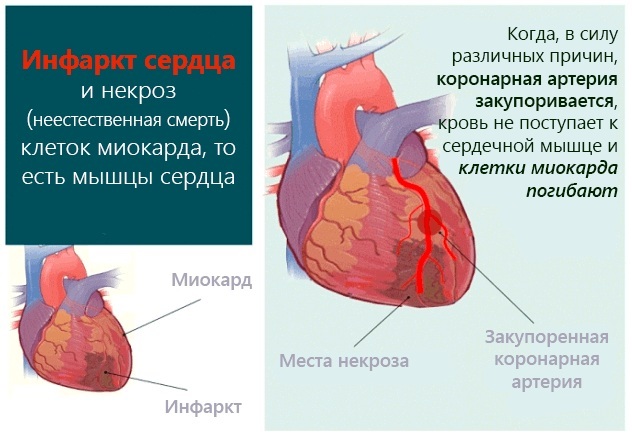
A complication of dilated cardiomyopathy is also sudden death, stroke, thromboembolism. The same goes for heart failure, valve dysfunction, edema, and arrhythmias.
Causes of sudden death in dilated cardiomyopathy
With dilated cardiomyopathy, the mortality rate is 60% if the person has not received timely medical attention. After therapy, these indicators decrease to 10-20%. The fatal outcome is due to the serious condition of a person whose heart function is seriously impaired. The same goes for thromboembolism, fibrillation, and heart failure.
After treatment, most patients live for 5 years. During this period, the heart wall gradually becomes thinner and it is more difficult for the organ to perform its functional duties. Human life expectancy is decreasing.
Forecast
The prognosis for dilated cardiomyopathy depends on numerous factors. Patients will have to make drastic lifestyle changes to extend their years.
The following factors are unfavorable:
- elderly age;
- chronic diseases that provoked dilated cardiomyopathy;
- bad habits (smoking, alcoholic beverages);
- extra pounds, obesity;
- improperly selected treatment or lack of positive dynamics.
Concomitant diseases seriously affect the prognosis in dilated cardiomyopathy (diabetes mellitus, arterial hypertension). It is important to strictly adhere to all the recommendations of the attending physician in order to prevent complications and improve prognosis for the future.
Dilated cardiomyopathy is a serious disease in which pathological processes affect the tissue of the myocardium. Its gradual development entails serious complications, up to and including sudden death. It is important to remember about prevention, visit a cardiologist in a timely manner and adhere to simple recommendations.
Video about cardiomyopathy
About dilated cardiomyopathy:



